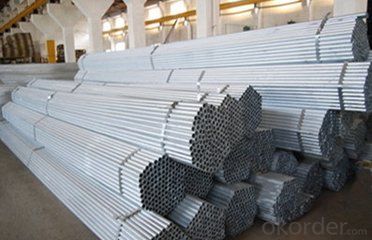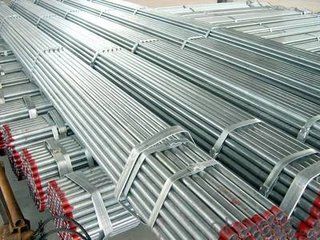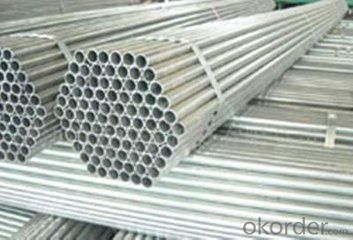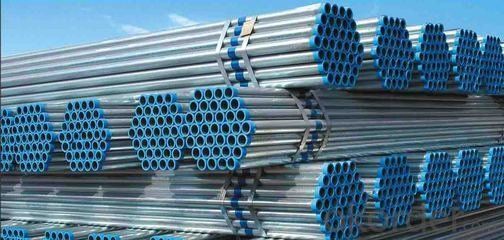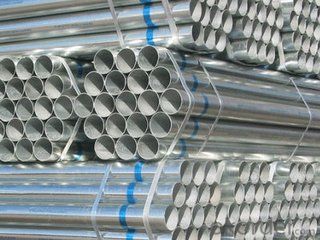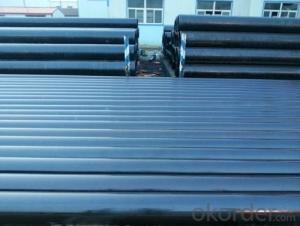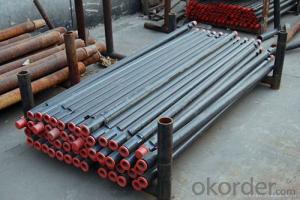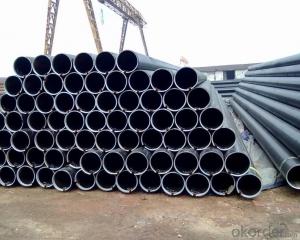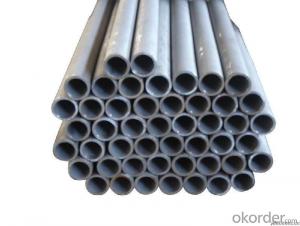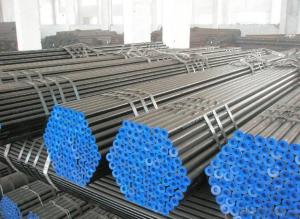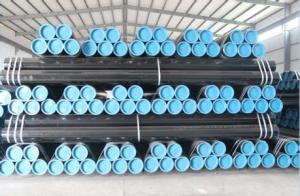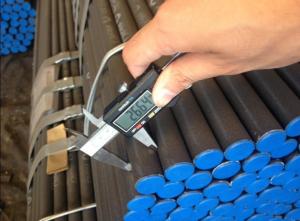3/4” Hot selling low price ASTM A179 Gr.C seamless carbon steel pipe
- Loading Port:
- Tianjin
- Payment Terms:
- TT OR LC
- Min Order Qty:
- 10 m.t.
- Supply Capability:
- 100000 m.t./month
OKorder Service Pledge
OKorder Financial Service
You Might Also Like
Specifications
HOT-DIP GALVANIZED PIPE FOR FLUID TRANSPORTATION
1.OD:33.4-114.3mm
2.WT:2.0-9.0mm
3.Zinc:200~600g/m2
Good serveice
We Offer You:
HOT-DIP GALVANIZED PIPE FOR FLUID TRANSPORTATION
HOT-DIP GALVANIZED PIPE FOR FLUID TRANSPORTATION | |||
1. Material | Steel Grade | Q195, Q235, Q345 etc. | |
Material Type | Available in cold rolled and hot rolled | ||
2. Size | W.T | 1.0mm-12mm | |
Diameter | 20mm~273mm | ||
Length | 5.8m-14m | ||
3. Zinc Coating | 200~600g/m2, could be thicker or thinner if you need | ||
4. Certification | BV, IAF, SGS,COC, ISO etc. | ||
5. Welding Technology | Longitudinal ERW | ||
6. Application | Urban construction, machine structure, agriculture equipment, water and gas pipes etc. | ||
7. Packing | Packing in bundle with steel strips; with seaworthy package at the end; could be done with your requirement. | ||
8. Delivery Time | Usually within 10-30 days after receipt of deposit, ASAP | ||
9. Trade Terms | FOB, CFR, CIF etc. | ||
10. Payment Terms | T/T, L/C etc. | ||
11. Loading Port | Xingang , Tianjin | ||
12. Original Place | Tianjin, China | ||
13. Company Information | Name | Reliance Metal Resource Co., Ltd | |
Type | Manufacture and trading company | ||
Supply Ability | 360,000 tons per year | ||
Galvanized Round Steel Pipe's Materials
| Elements Material | Chemical Compsition% | Mechanical Property | ||||||
| C% | Mn% | S% | P% | Si% | Yield Point (Mpa) | Tensile Strength(Mpa) | Elongation (%) | |
| Q195 | 0.06-0.12 | 0.25-0.50 | <0.050< span=""> | <0.045< span=""> | <0.030< span=""> | >195 | 315-430 | 32-33 |
| Q215 | 0.09-0.15 | 0.25-0.55 | <0.05< span=""> | <0.045< span=""> | <0.030< span=""> | >215 | 335-450 | 26-31 |
| Q235 | 0.12-0.20 | 0.30-0.70 | <0.045< span=""> | <0.045< span=""> | <0.030< span=""> | >235 | 375-500 | 24-26 |
| Q345 | <0.20< span=""> | 1.0-1.6 | <0.040< span=""> | <0.040< span=""> | <0.55< span=""> | >345 | 470-630 | 21-22 |
- Q: How are steel pipes used in the agricultural sector?
- Steel pipes are commonly used in the agricultural sector for various purposes such as irrigation systems, drainage systems, and construction of structures like greenhouses and barns. They are durable, strong, and can withstand harsh weather conditions, making them ideal for these applications in the agricultural industry.
- Q: What is the pressure rating of steel pipes?
- The pressure rating of steel pipes varies depending on the specific grade and size of the pipe. However, steel pipes are known for their high strength and durability, allowing them to withstand high-pressure applications.
- Q: What is the weight and strength of steel pipes?
- Steel pipes can vary in weight and strength depending on their dimensions and the specific grade of steel used. The weight of steel pipes is typically measured in pounds per foot or kilograms per meter. The strength of steel pipes is commonly measured in terms of its yield strength and ultimate tensile strength. The weight of steel pipes can range from a few pounds per foot for smaller sizes to several hundred pounds per foot for larger diameters and thicker walls. The weight is influenced by factors such as the pipe's outer diameter, wall thickness, and length. For example, a 1-inch diameter steel pipe with a wall thickness of 0.125 inches may weigh around 0.67 pounds per foot, while a 12-inch diameter steel pipe with a wall thickness of 0.5 inches can weigh around 142 pounds per foot. The strength of steel pipes is determined by the grade of steel used, which can vary depending on the application and specific requirements. Common grades of steel used for pipes include ASTM A53 for general-purpose applications, ASTM A106 for high-temperature service, and API 5L for oil and gas transportation. These grades have different yield strengths and ultimate tensile strengths. Yield strength refers to the amount of stress a steel pipe can withstand before it begins to deform plastically. It is usually measured in pounds per square inch (psi) or megapascals (MPa). For example, ASTM A53 Grade B steel pipe has a minimum yield strength of 35,000 psi (240 MPa), while API 5L Grade X65 steel pipe has a minimum yield strength of 65,000 psi (448 MPa). Ultimate tensile strength, on the other hand, is the maximum stress a steel pipe can withstand before it fractures. It is also measured in psi or MPa. For instance, ASTM A106 Grade B steel pipe has an ultimate tensile strength of 60,000 psi (415 MPa), whereas API 5L Grade X65 steel pipe has an ultimate tensile strength of 77,000 psi (531 MPa). In summary, the weight and strength of steel pipes can vary depending on their dimensions and the grade of steel used. The weight is influenced by factors such as the pipe's diameter, wall thickness, and length, while the strength is determined by the steel's yield strength and ultimate tensile strength.
- Q: Can steel pipes be used for conveying solids?
- Yes, steel pipes can be used for conveying solids. Steel pipes are commonly used in various industries to transport solid materials such as ores, minerals, grains, and other bulk materials. They are durable, resistant to high pressure and temperature, and have a smooth interior surface that allows for efficient flow of solids.
- Q: How are steel pipes used in the manufacturing of oil refineries?
- Steel pipes are essential in the manufacturing of oil refineries as they are used for various purposes such as transporting crude oil, petroleum products, and other fluids throughout the facility. These pipes are used for the construction of pipelines, storage tanks, and various process equipment within the refinery. They provide a reliable and durable means of conveying and distributing fluids necessary for the refining process, ensuring efficient operations and the safe transportation of oil and its byproducts.
- Q: How do you protect steel pipes from fire?
- One way to protect steel pipes from fire is by applying a fire-resistant coating or insulation. This can help prevent the pipes from reaching the critical temperature where structural integrity is compromised. Additionally, installing fire rated enclosures or barriers around the pipes can provide an extra layer of protection. Regular inspections and maintenance are also crucial to ensure any potential fire hazards are identified and addressed promptly.
- Q: Is the electric pipe used with steel pipe or PVC pipe?
- Electric pipe laying is generally divided into the following circumstances:1) the explosion-proof area must be galvanized steel pipe and explosion proof flexible pipe (used for front end equipment connection);2) non explosion-proof area can use KBG pipe or PVC tube, the former is higher cost, but the installation is firm, the latter is low cost, easy to construction, and in the rain where it will not rust, but compared to the KBG pipe may be damaged.
- Q: Can steel pipes be used for underground water supply pipelines?
- Indeed, underground water supply pipelines can utilize steel pipes. The reason for the widespread use of steel pipes in water supply systems is their ability to endure, their strength, and their resistance to corrosion. They can withstand high levels of pressure and can accommodate large quantities of water. Furthermore, steel pipes come in a variety of sizes and thicknesses, granting flexibility in the design and installation of underground water supply pipelines. However, it is crucial to ensure that the steel pipes are appropriately coated or lined to avert corrosion and uphold the water's quality during transportation. Regular inspections and maintenance must also be carried out to prevent any potential problems with the steel pipes.
- Q: What's the difference between hot-rolled seamless steel tube and cold-rolled seamless steel tube?
- Cold rolled seamless steel pipe (DIAL) in general, steel pipe for low and medium pressure boiler tube, high-pressure boiler steel pipe, alloy steel pipe, stainless steel pipe, oil cracking tube and other steel tube, including carbon thin-walled steel, alloy thin-walled steel, stainless steel, thin steel tube.
- Q: What's wrong with the 3PP anticorrosive steel tube?
- At present, mainly foreign related products come out, for some countries with relatively high ambient temperature, and PP than PE to hard, so as to avoid scratching coating.
Send your message to us
3/4” Hot selling low price ASTM A179 Gr.C seamless carbon steel pipe
- Loading Port:
- Tianjin
- Payment Terms:
- TT OR LC
- Min Order Qty:
- 10 m.t.
- Supply Capability:
- 100000 m.t./month
OKorder Service Pledge
OKorder Financial Service
Similar products
Hot products
Hot Searches
Related keywords





